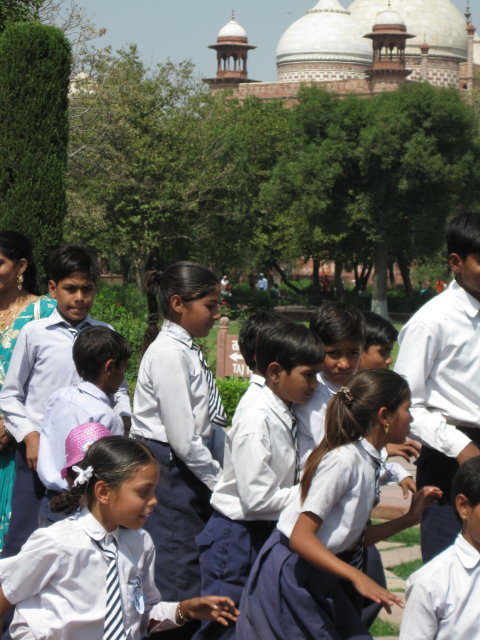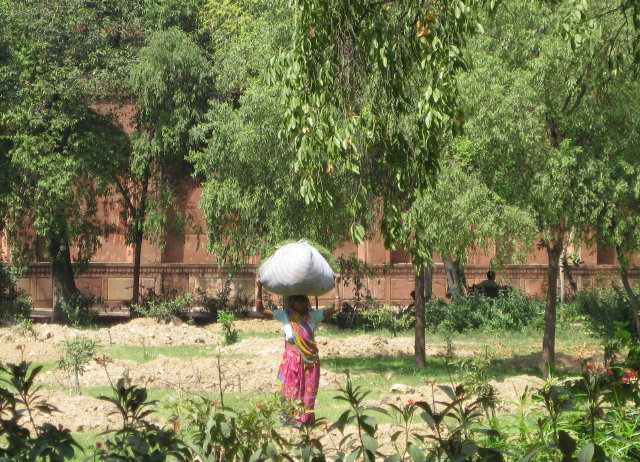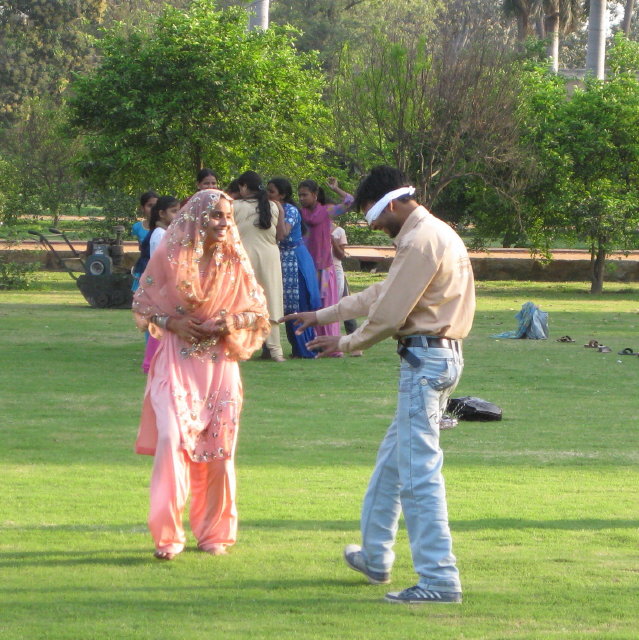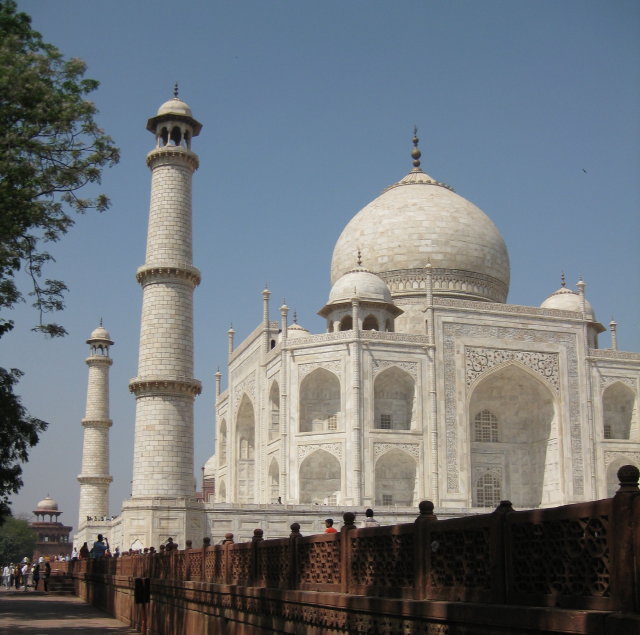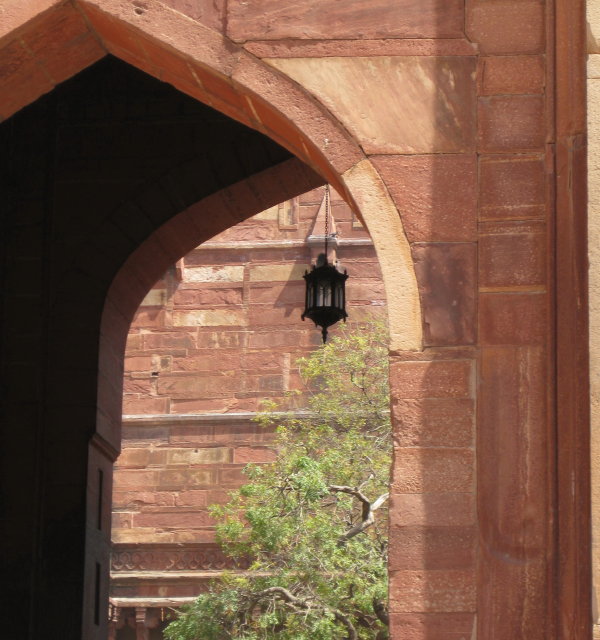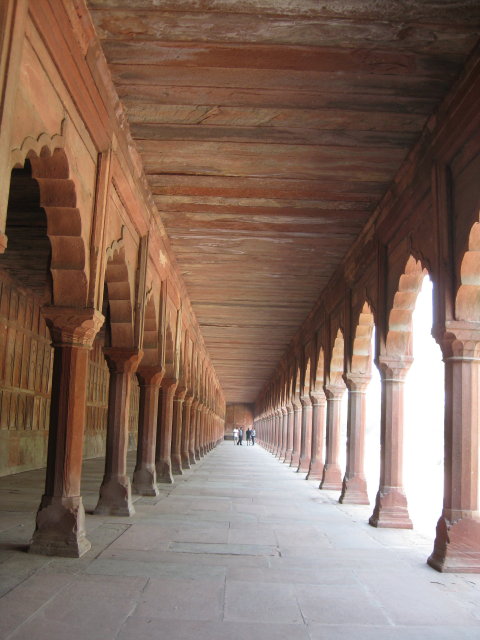We see it all as we move through India in huge, air-conditioned motor coaches, honkies honking all the way. The heat is oppressive when we leave them and we are all set upon by a crush of vendors and beggars at their doors. Many of the beggars are maimed or deformed and they carry children; we’re told that they often aren’t their own and that the children are sedated so we’ll take pity that they’re ill. We’re told, over and over again, not to mind them but sometimes they all clamor for attention so aggressively that students must run a gauntlet through them and are paralyzed with fear and indecision. Our guides tell us not to speak or make eye contact with anyone, but the young students don’t seem able to do that. They very much want to speak with Indian people but every exchange of words turns into a contested sale. We never really get a chance to speak with people who live in India, beyond those we meet on the ship who are first or second generation. In the compounds of the monuments we tour there are an astonishing number of men who visit, especially young men, in far larger numbers than women. In our visit to the Taj Mahal, women and men are required to wait in separate lines with the line for men easily ten times the length and even longer for all of the more rigorous security checks of the men. (This causes our group of men and women students a major problem getting through security and the ticket gate because we must wait for all of the male students. We wind up with a mere 55 minutes for our visit.)
I catch a glimpse every once in a while of how proud our guides are of their country and, at a next moment, I see how discomfited they are by something they see as particularly distasteful in the eyes of the American students and faculty they escort through the chaos of people and shambles. All of the people who help us with our travel try hard to make us comfortable in every way; they try so hard that their constant questioning whether arrangements are satisfactory embarrasses me—to the point where I call everything excellent, whether it is or not. Our expectations and standards seem outrageous under the circumstances of what we see of life in India.
I would guess that everyone feels guilty pretty much all of the time because there is no way that we could ever give or buy enough. We’re advised by our guides that if we start we can wind up with a crowd of people besetting us that can get out of control. (We are repeatedly told that the best thing we can do is to give to reputable charities and not to the people who accost us.) When we stop at pre-arranged places for lunch or dinner, the squalor surrounding their fine spas and resort hotels feels ridiculous. How can anyone come for spa treatments when right outside the gates and past the security forces are people eking out the barest living?
But this is just me, just now. It will be a long time before I can have a longer view on what we experience in India. There are members of the faculty who see nobility in the suffering. One of the students in my group is from a South American country and she tells me that I am reading too much anguish into situations that everyone accepts as normal. Perhaps that is true but I don’t know that it is right. India is also a country we’re going to expect to do more to prevent calamitous global warming when it is obviously incapable of providing for its people under any circumstances and with or without carbon.
One thing is for sure: If India really portends what all the rest of us will need to become reconciled to in the way of drab and dry, we will have to learn from India’s women. In the midst of it all, they craft and wear the most elegant dress with the deepest hues of color and of the finest materials they can afford. They mix cement for road and sidewalk work with their family members—grandparents, parents, children–in brightly colored saris and silver bangles. Sometimes there’s not much joy in their beauty but they are always the most beautiful spot wherever they appear. At the Taj Mahal, it is a special treat to watch young women at play evade a blindfolded young man and school children thrilled to be on a field trip to this national treasure with their teachers and docents. I don’t take photos of many other people because it does not seem right to do so, but there are other moments of beauty I will remember: A father walking his young daughter from school through the maze of honking traffic; a goat herder petting one of his goats as he tries to calm them and keep them from being run over; an old lady unperturbed by dust clouds and passersby meticulously and constantly dusting her display of fruits and vegetables; another older woman in full sari trimming with ordinary hand scissors the grass around shrubs on the lawn of the Taj Mahal and afterwards hauling away a huge bundle of clippings on her head.


